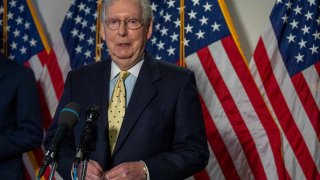
As Congress debates what to include in the next stimulus package, the key to fixing the U.S. economy is fairly straightforward, economists say: Get the coronavirus under control. Economic recovery can only come if citizens feel safe.
Unfortunately, "straightforward" doesn't necessarily mean simple, Michael Klein, executive editor of Econofact, a nonpartisan economic publication, tells CNBC Make It. A disjointed and unreliable federal response to the virus has exacerbated not just the virus itself, but likely the subsequent economic downturn as well, says Klein.
Because of the resurgence of the virus in states that opened too early and the following re-shutdown of local economies, "this is not going to be a V-shaped recovery," says Klein. "There's going to be a lot of economic pain, and policy makers should recognize that people will be put in a hard position without support from the government."
To minimize that pain and get the economy into better shape, here are the seven things Congress should prioritize in the next stimulus package, according to economists and other experts.
1. Consistent government response
First, the government needs to set a consistent example to express how seriously Americans should take the coronavirus threat. This includes not pushing states and cities to open earlier than is safe and encouraging people to embrace "safe activities" like wearing a mask and properly socially distancing until the virus is under control, says Klein.
One of the things that has hampered recovery in the U.S. is that the government has sent conflicting signals for months on just how big of a problem Covid-19 is and what measures need to be taken to prevent its spread, says Klein.
Money Report
"There's been such mixed messaging, it's really affecting people's understanding and willingness to take actions to control the virus more," says Klein, who is also a professor of International Economic Affairs at The Fletcher School at Tufts University. "If you didn't tend to believe in the importance of face masks, there were politicians pushing that view so you might be listening to them."
2. Extend enhanced unemployment insurance
Extending enhanced unemployment insurance is imperative to the economy recovering, and is preferable to another one-time stimulus check because it would help those who need it most on a continued basis, says R.A. Farrokhnia, professor of finance at Columbia Business School.
On Monday, the Senate GOP introduced a bill that would extend enhanced unemployment benefits at $200 per week through September, replacing the $600 per week benefit that just expired. In October, total state and federal jobless benefits would start being capped at 70% of lost wages. The bill will now be negotiated with the Democratic-controlled House.
While Congress debates how much the wage replacement rate in the next bill should be, Farrokhnia says it should vary, based primarily on income before the pandemic and how much savings each household has. This way, "the most vulnerable household without much savings would be as protected as possible," he says.
"It's not that people don't want to work, the jobs just aren't there," adds Klein. "The complaint that UI was too generous and therefore preventing people from going to work seems to me to be quite overblown."
The Pandemic Unemployment Assistance program, which extends unemployment benefits to business owners, self-employed Americans, gig workers and independent contractors who are not typically eligible for UI, should also be extended past the Dec. 31, 2020 deadline to at least June 30, 2021, says Stijn Van Nieuwerburgh, a professor of finance and real estate at Columbia Business School.
"The profound impact of the economic fallout is truly hurting many working Americans, and it is imperative to provide financial support and workable solutions commensurate with their financial obligations," says Farrokhnia, especially for essential expenses like food and housing.
3. Increase funding and expand eligibility for SNAP
In June, 26% of Americans reported they or a member of their household had gone without meals or relied on charities or government programs to obtain groceries since the coronavirus pandemic started. The CARES Act made it easier for families to be eligible for assistance, and that should continue, says Klein.
Along with unemployment insurance, the Supplemental Nutrition Assistance Program, or SNAP, which provides food benefits to low income people so they afford groceries, is the biggest safety net program that helps people who are unemployed, he says.
"You have to help people, especially in the most vulnerable sectors," says Klein. "Otherwise, there's going to be a huge amount of human economic hardship in addition to the health crisis."
SNAP helps the people who need aid the most, and is "one of the fastest, most effective forms of economic stimulus because [recipients] quickly inject money into the economy — and a SNAP benefit increase can be implemented virtually immediately," writes the Center on Budget and Policy Priorities. Every "SNAP dollar that a low-income family receives enables the family to spend an additional dollar on food or other items."
4. Support state and local governments
Additional support for state and local governments is also critical because unlike the federal government, state governments can't run budget deficits, says Klein.
Without additional aid, "you're going to have teachers and firefighters and police officers laid off because of the deep deficits," he says.
5. Subsidize COBRA payments
Millions of Americans have lost their health insurance coverage along with their jobs because of the coronavirus recession. To help those choosing to pay for health insurance out of pocket, the government should consider subsidizing COBRA payments, says Van Nieuwerburgh.
COBRA, or the Consolidated Omnibus Budget Reconciliation Act, allows some workers who lost their jobs to keep their workplace insurance plans for a certain amount of time at their own expense, averaging about $600 a month.
The government could pay "the difference between the cost and, say, $2,500 contributed by the individual, for all job losses due to Covid," Van Nieuwerburgh suggests.
6. Provide renter assistance
To prevent a housing apocalypse, the federal government could also provide "renter assistance for people who cannot afford their rent due to Covid-related decline in income," says Van Nieuwerburgh. "Especially if they should receive unemployment insurance but are still waiting for some or all of their payments."
Housing advocates have called for $100 billion in rental assistance, plus a uniform nationwide eviction moratorium to prevent an onslaught of evictions in the middle of a global health crisis.
On Friday, the eviction moratorium put in place by the CARES Act expired, though some states and cities have implemented their own bans.
The HEALS Act does not extend the eviction moratorium, instead proposing $3.3 billion to "cover lost income for current Housing Choice Voucher, Public Housing and Rural rental assistance tenants," according to the National Low Income Housing Coalition. That's far less than the $100 billion in rent relief that housing advocates are calling for, which was included in the HEROES Act, passed by the House in May.
7. Increase child-care funding
Without proper child care, parents won't be able to return to work. Child-care advocates are calling for at least $50 billion in child-care stabilization funds so that child-care centers and schools can improve their facilities, hire more staff and afford the necessary PPE equipment and sanitation supplies needed to adhere to stricter regulations from the CDC and state education departments.
The HEALS Act includes includes about $70 billion to help schools reopen in the fall.
Don't miss:
- Here's what to know if you are considering breaking your lease
- Here's why economists say arguments against extending unemployment benefits don't hold up
- Millions of Americans will fall off an 'income cliff' when extra $600 in unemployment benefits ends next month
- Ending the extra $600 federal benefit will harm 'vast majority' of unemployed workers, especially women and people of color
Check out: The best credit cards of 2021 could earn you over $1,000 in 5 years






